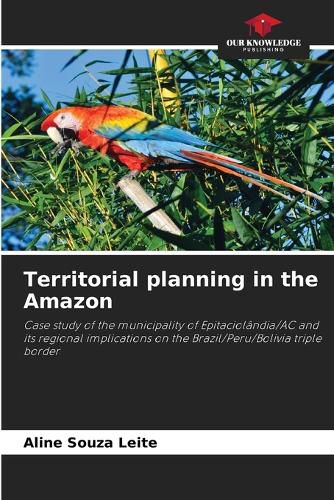Readings Newsletter
Become a Readings Member to make your shopping experience even easier.
Sign in or sign up for free!
You’re not far away from qualifying for FREE standard shipping within Australia
You’ve qualified for FREE standard shipping within Australia
The cart is loading…






Territorial planning is a fundamental instrument for organizing human geographical spaces, ensuring greater levels of efficiency in production systems, including aspects related to environmental conservation and social welfare. The importance of this instrument becomes even more evident in border regions, as is the case of the municipality of Epitaciolandia-AC, where the contact defined by the Brazil/Bolivia/Peru triple border in the Amazon is a potential conflict zone, signaling the need to align public policies at an international level. This paper describes how the land-use planning process is taking place in the municipality of Epitaciolandia, with the aim of integrating the productive and administrative sectors in order to design, in future scenarios, new possibilities for social collaboration aimed at resolving the conflicts specific to the region under study. The aim is to demonstrate how the issue of territorial planning at borders should be dealt with, in order to integrate management actions and guidelines between neighboring countries, taking into account the inclusion of traditional communities and respect for their cultural differences.
$9.00 standard shipping within Australia
FREE standard shipping within Australia for orders over $100.00
Express & International shipping calculated at checkout
Territorial planning is a fundamental instrument for organizing human geographical spaces, ensuring greater levels of efficiency in production systems, including aspects related to environmental conservation and social welfare. The importance of this instrument becomes even more evident in border regions, as is the case of the municipality of Epitaciolandia-AC, where the contact defined by the Brazil/Bolivia/Peru triple border in the Amazon is a potential conflict zone, signaling the need to align public policies at an international level. This paper describes how the land-use planning process is taking place in the municipality of Epitaciolandia, with the aim of integrating the productive and administrative sectors in order to design, in future scenarios, new possibilities for social collaboration aimed at resolving the conflicts specific to the region under study. The aim is to demonstrate how the issue of territorial planning at borders should be dealt with, in order to integrate management actions and guidelines between neighboring countries, taking into account the inclusion of traditional communities and respect for their cultural differences.